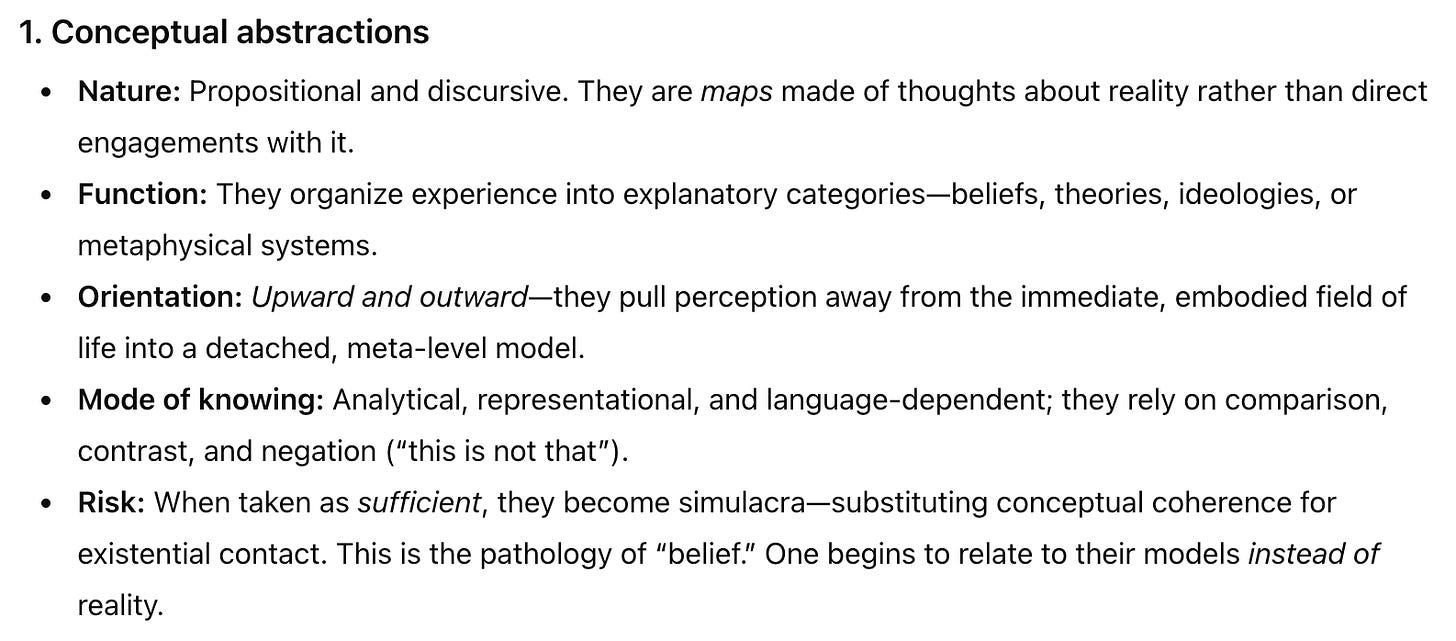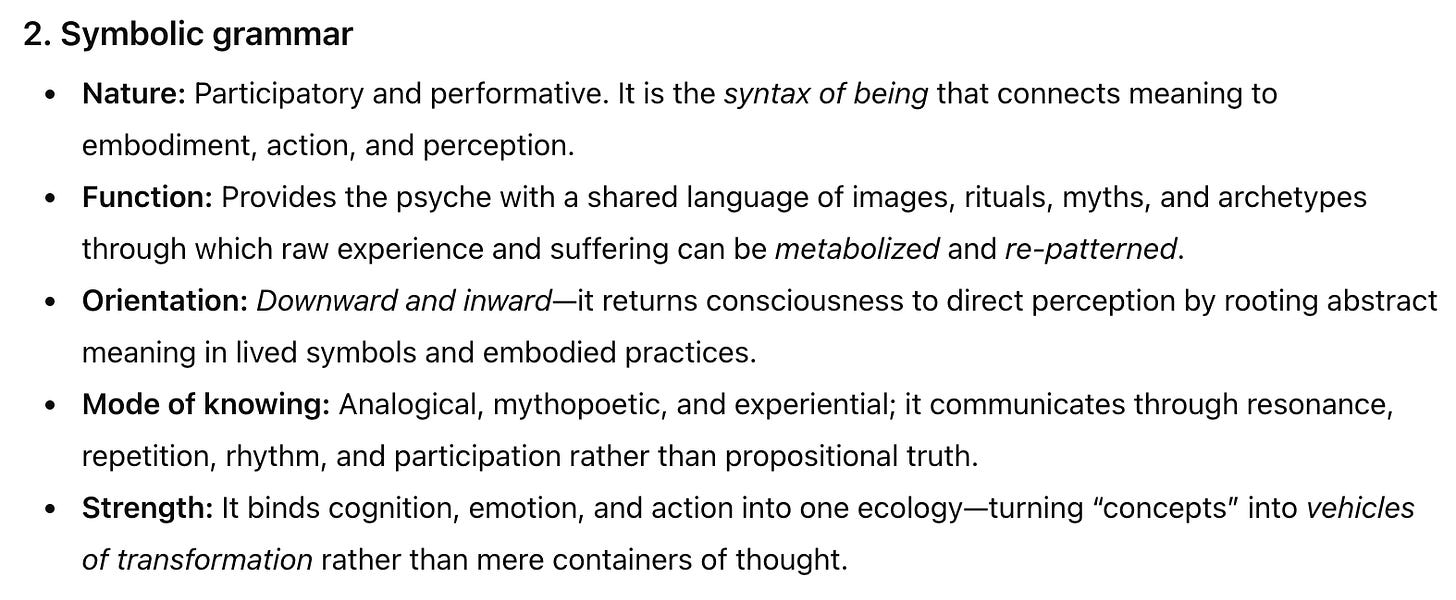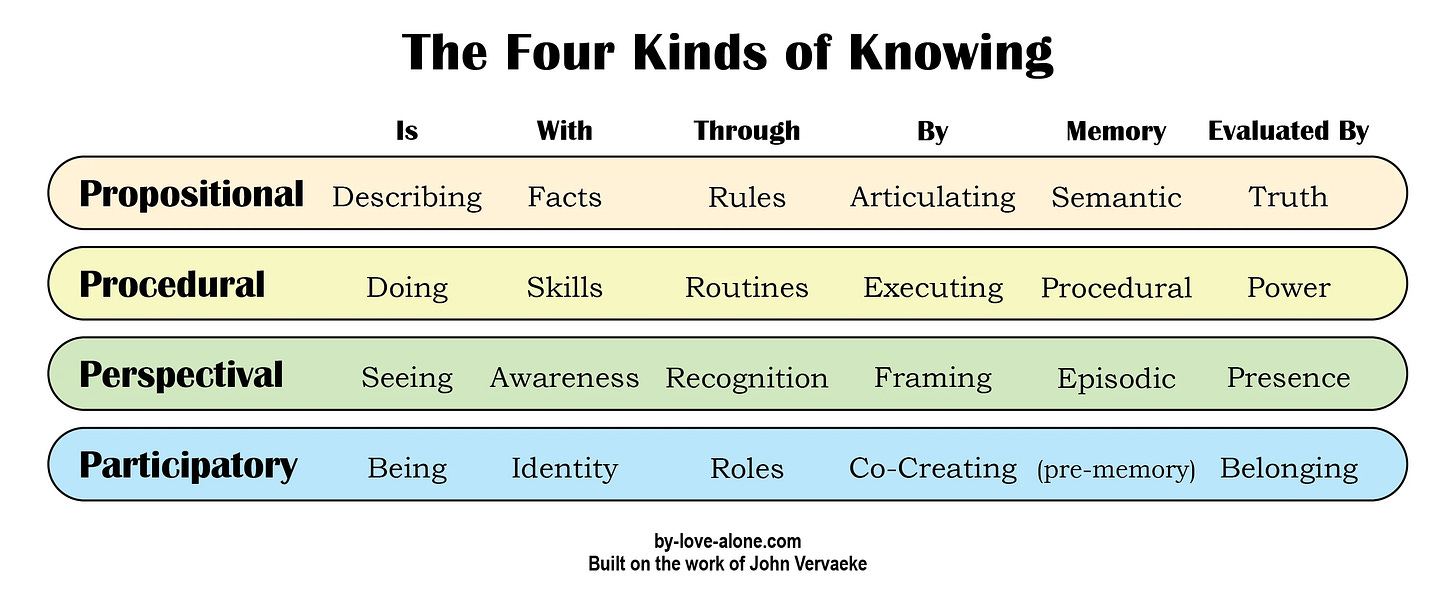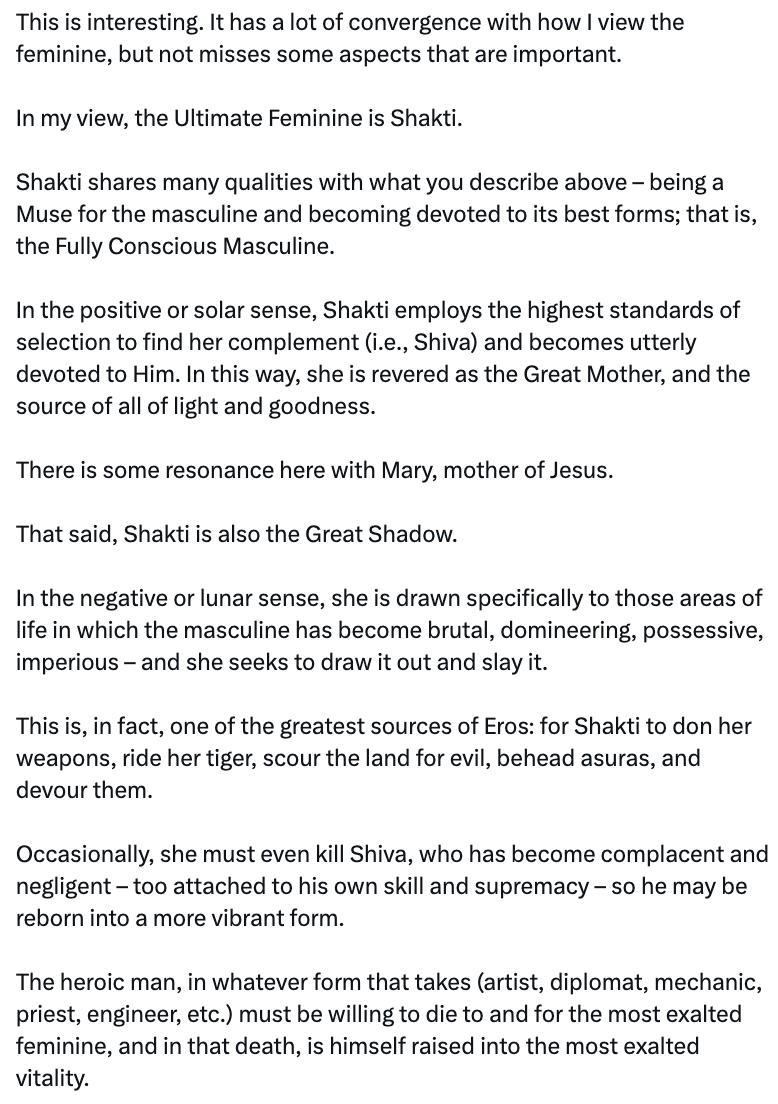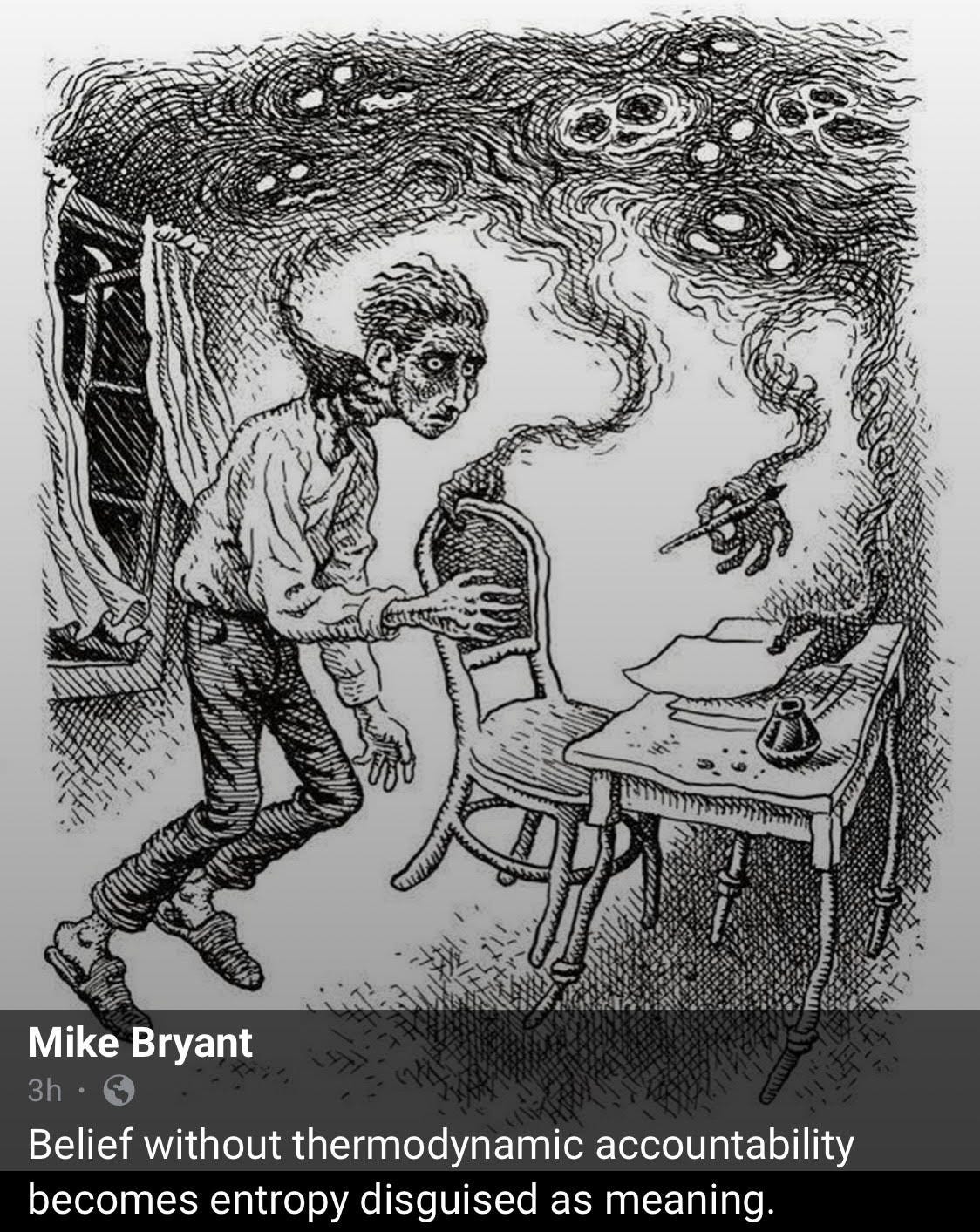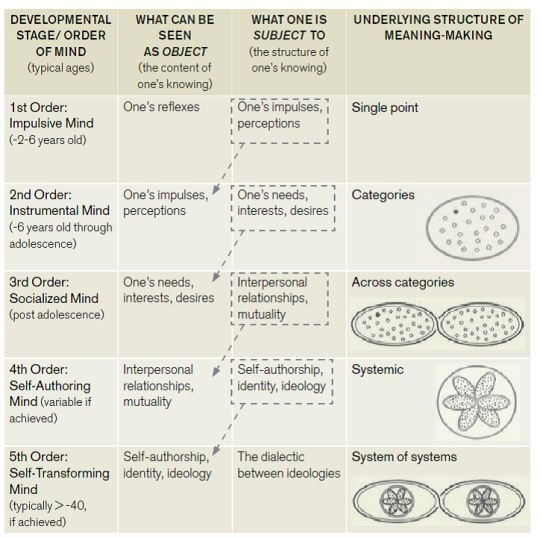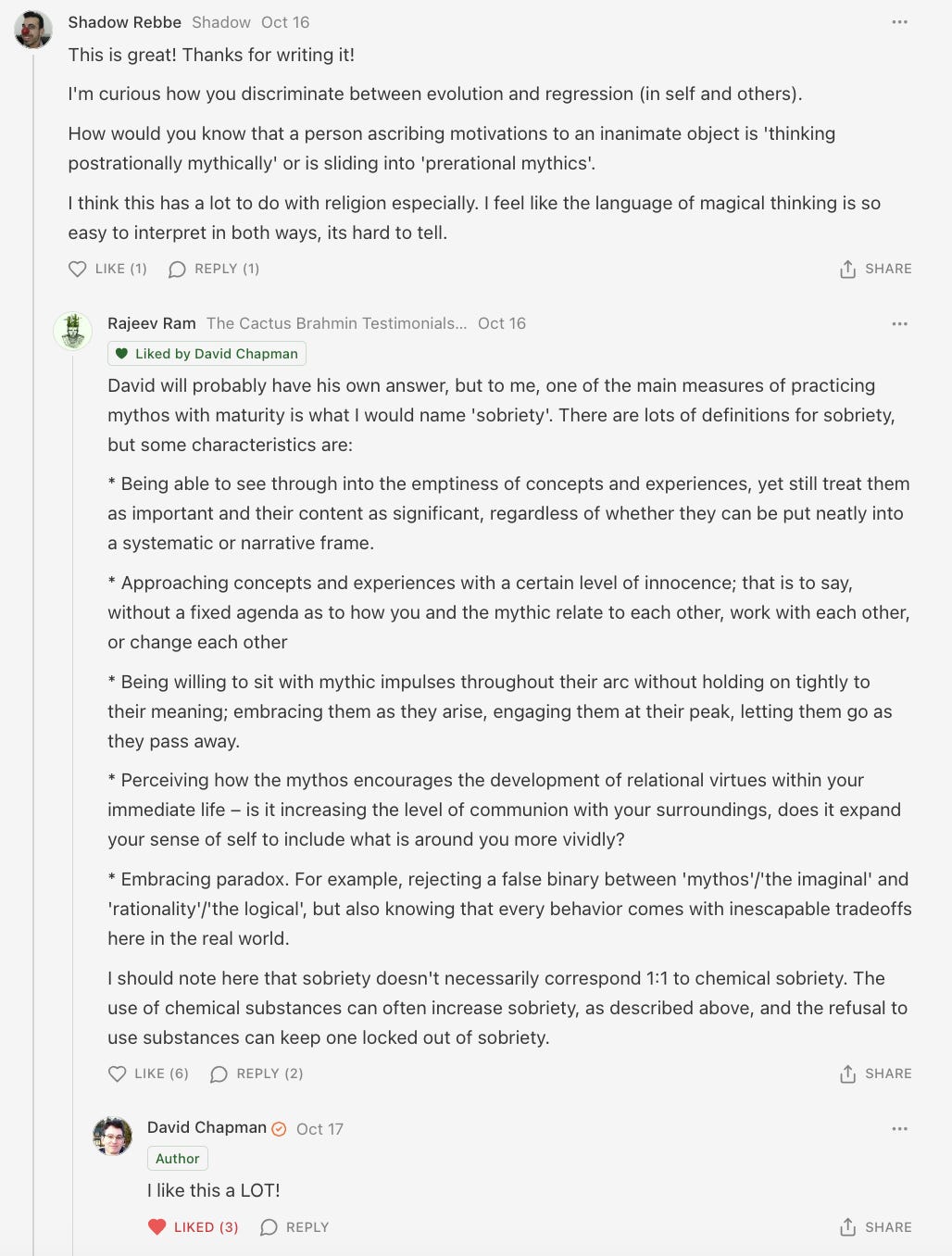Proper Spirituality as a Developmental Ecology of Symbolic Grammars
How does one consciously architect an interoperable mythic pattern language?
The following post is a somewhat half-baked outline that I’m publishing in service of an upcoming livestream dialogue that I will be co-hosting with on Substack.
The livestream will take place on Sunday, December 7th @ 11AM Mountain Standard Time.
Motivating Premise (i.e., Tweet)
Gabe recently wrote a long post on Zen and character development that struck a chord. I’ve tended to have a lot of problems with the type of Buddhism that sprouts out of the American West Coast, especially from post-rationalist, tech-adjacent networks. That’s partially why I no longer live in the Bay Area, or really attempt to make any spiritual friends from there anymore — including online ones.
I respect that Gabe seems to be tackling head-on the underlying issues that lead to the uncontained spiritual immaturity that arises within those cultural spaces.
His essay triggered my own reflections on the nature of virtue and whatnot, though my ramblings are less accessible because they use too many Latinate words and dependent clauses.
The crux of my post comes to this:
This entire process [of humbling oneself to reality] is a gauntlet, and requires both immense external support from those who love … capable individual[s], encouraging them to become more actualized in their area[s] of weakness; and immense internal faith that their [own] fundamental worth doesn’t derive from their strength, and relinquish need a for validation thereof.
My definition of proper spirituality includes that which can provide what is described in the previous paragraph on an ongoing basis.
What’s common between both these essays is the recognition of spirituality as a developmental program – parents must help their children grow up, after all – a responsibility as old as time itself1.
Alright, so what ought to be included in this “developmental program” of spirituality? Strap in, because my ADHD is about to manifest.
My prototype argument for what this “proper spirituality” addresses as a developmental program.
There exists an unavoidable need in most (or all) individuals to be inculcated into a mature mythic symbolic grammar as a developmental stage. Without this, the psyche lacks the architecture to metabolize experience, suffering, and mystery.
A concrete example of this is the way that the Eucharistic trans-substantiation instructs on the meaning of grace and sacrifice so that the congregation goes forth and acts accordingly in their lives.
There is an important difference between conceptual abstractions that take one outside of direct perception of life into delusion (i.e., beliefs) and a symbolic grammar that puts one back into direct perception of life and its myriad patterns (i.e., practice)2.
A solid spiritual foundation cannot be merely discursive—it must be existential. The key contention is whether conceptual abstractions (i.e., representations) promote the other existential-cognitive modes besides the propositional, or interfere with them; either absent or alongside practices derived from a symbolic grammar.
The existential-cognitive modes I’m referring to come from John Vervaeke’s 4P Framework, which names four types: propositional, perspectival, procedural, and participatory.
Symbolic grammar, unlike belief, directly engages all four modes of knowing: propositional (meaning), procedural (ritual), perspectival (orientation), and participatory (communion).
There is enormous appraisal on the ability to interact successfully with “other” (i.e., foreign, outside one’s preferred) symbolic grammars in a non-extractive, non-appropriative, non-reductionist way. This can be through assimilation, borrowing, adaptation, fusion, translation, cross-pollination, apprenticeship, or dialogue. The key is to preserve the integrity of each grammar’s internal logic while allowing resonance.
My mini-essay here is an attempt to create this type of intra-grammar interaction. Important! These words accomplish, e.g., translation and dialogue, but do not attempt, e.g., fusion or borrowing. Maintaining clarity and purpose when interacting with foreign grammars matters!
Continuing from the previous point, this is from where the “ecology of practices” view derives its power. A healthy moral or spiritual system resembles an ecosystem, where multiple grammars coexist and inform each other through feedback and tension, not just rigid hierarchy.
The spiritual ecology moves individuals and groups beyond the perspectival (e.g., analogy and analytic deconstruction) and procedural (e.g., ritual and rote) modes into deep participation, i.e., communion-with-reality properly understood.
An ecology of symbolic grammars is the fulcrum on which spirituality as a developmental program rests.
My personal view the best spiritual systems build up practices that enrich grammar at the same time that they destroy beliefs.
Whatever harmonious ecology one takes up as they move toward adulthood must be able to resolve and cohere with the individual’s initial or inherited cultural and/or religious symbolic grammar.
This is a really crucial point!
This is the reason most Eastern ontologies fail in the West: they refuse to engage and reconcile with the Christian (specifically Catholic and Protestant) symbolic grammar underpinning much of Western consciousness. Without reconciliation, these Eastern practices remain ornamental, untethered, becoming bypassing mechanisms – even if they are situated in a rich ecology of otherwise nourishing practices and accompanying symbolic grammar.
There are huge limitations & risks in asking someone to abandon their grammar (i.e., the way their praxis, symbols, and beliefs are bound) without testing or verifying that they have a well-developed character.
For example, a Buddhist teaching someone to dissolve their ego into Pure Awareness/Dao when they only have access to oppressive, ill-conceived, or junk grammars (from e.g., popular culture, politics, youth social movements, etc.) in their day-to-day life is a disaster.
Disintegration without integration is not liberation, it’s fragmentation, which will only fuel more histrionic narcissism. There’s already plenty of that to go around in hyper-modern times.
Building bridges between symbolic grammars so that individuals, families, and tribes can reconstitute meaning in stages outside of fixed belief structures while maintaining their cultural anchoring will more likely than not require some sort of religious scaffolding, if only as a holding pattern for ongoing evolution.
Here is a picture of Kegan's stages because he talked about a lot of this stuff, and many people seem to like his framework for approaching developmental ontology.
Cool, so given all you’ve said, are you actually going to do the thing participatorily instead of merely talking about it?
This is why instead of leaving this as a post or private discussion, we’re going to talk about these arguments on a live-stream. That way, the audience can ask questions, and we can engage with them in the moment 🎉.
Additionally, as it turns out, Gabe is hosting a retreat this winter at his retreat center, Nameless Mountain, called Structure, aiming to address many of the points I came up with. I did not know this at the time I proposed the outline for this livestream with him, but it seems apt.
If any of you are attending and end up having a kick-ass life as a result, you can come back and thank me 😘.
Alright, so, you’re both going to be taking out of your ass extemporaneously for a long time, without even bothering to edit the bad parts out, as per podcast etiquette?
Well, yes, because that’s one of my favorite hobbies.
But, clearly, we’ve both been musing on these things for a while, so we’re at least a little bit qualified. For example, I will reproduce an email I sent to some friends on an exclusive email list dedicated to weirdos addressing these arguments in real time.
Yes, for a mature adult to pick non-credible foundations just for a sense of spiritual security is a terrible choice.
But, children do this all the time. Rather than “supernatural” or “metaphysical”, it is called “fantasy”.
Fantasy is an excellent mode of play — containing both revelation and insight, and in the best cases, directly connected back to the natural world. I believe John Vervaeke calls this the “imaginal” (and distinguishes this from imaginary).
As an adult, it is unwise to engage in the imaginal/fantastical in the same way as a child does. There is more needed.
David Chapman has written about this:
And I wrote a response to his piece on what sobriety looks like in this mode:
There is the other important fact that most people have not been given a proper way to grow past and out childhood, and this need for parental guidance is endemic (even in myself to a large degree!)
Thus, the sins of clinging to “supernatural” are not going away with mere explanations of why “metaphysical beliefs” are poison pills of the sacred.
The goal of a mature symbolic grammar is not to abolish fantasy, but to transmute it into imaginal participation — the adult continuation of childhood mythic play, grounded in existential sobriety and communal reciprocity.
Alternatively, I might claim that spiritual maturity is exactly the capacity to hold multiple symbolic grammars in dialogue without collapse into relativism or reversion to naïve belief.
Lastly, let me state what makes Gabe a good discussion partner, in my opinion…
(Besides the fact that he’s an ultra wordcel and unhinged X poaster)
I had the privilege of attending his first men’s retreat at Nameless Mountain: Project Crucible, now renamed Theseus Lodge. I was impressed with the thoroughness and clarity with which he presented a framework of meta-modern masculinity and brought it to bear.
We share some common background, both having direct exposure to: classical liberalism as a political organizing principle, West Coast post-rationalism as a cultural scene, Eastern contemplative traditions as a source of character development, and delayed adult development within the Millennial cohort.
On the other hand, we have enough differences in the vocabulary we use and general life history that our conversation would be dynamic, bridging across experiential divides.
As someone who co-founded and runs my own fraternal organization, I believe sharing “show notes” and “runtime notes” with others creating similar endeavors.
As we’ve been planning for this dialogue, one of the consequential things Gabe pointed out is that most of us are already expending tremendous effort and energy architecting interoperable mythic pattern languages in our lives.
This is true whether we’re speaking about how we construct our individual selfhoods, how we identify and exalt various “external” objects3, how we build and maintain relationships, or even how we hold the importance of “spirituality” within the day-to-day flow.
The more significant question, then, is whether we are engaging in this process with skill, care, and devotion — and how we might teach one another better ways to do so, in order to expand both our sense of what we cherish and our capacity to take responsibility for it.
All I can say is, “Same here bro 🫂.”
Come join us on December 7th @ 11AM MST!
Or maybe only as old as the emergence of K-selected sexually dimorphic species.
I’m not trying to create a false hierarchy here by elevating one of these over the other. I’m simply pointing out that one of these is alive, and the other one is dead. Dead things (i.e., representations) are okay – great, in fact – as long as one knows how to lay them to rest and maybe also use them as manure.
Objects means either physical possessions or mental representations.




